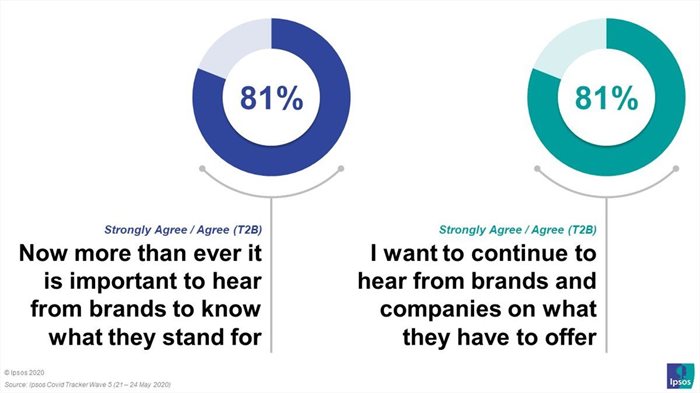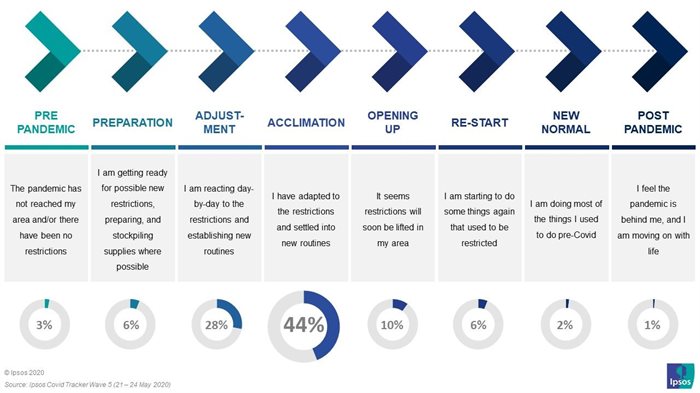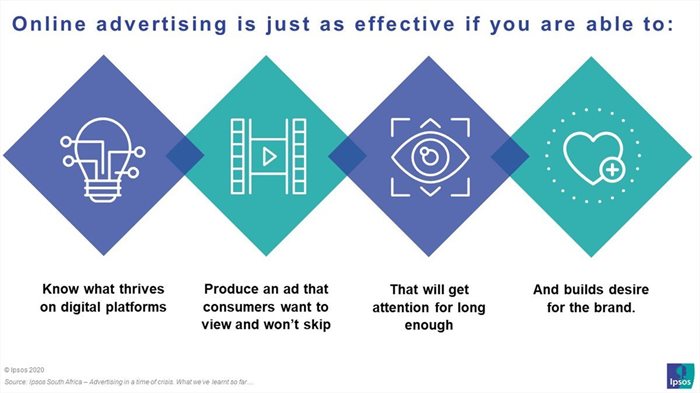According to Ipsos South Africa, currently South Africans are very much aligned with the rest of the world, indicating that they are in the acclimation phase where they have started to adapt to restrictions and create new routines.
As we emerge from lockdown, it’s unlikely that we will resume pre-2020 behaviours, and the full impact that this has on advertising and brands continues to evolve. With the vaccine still a long way away, these changed behaviours are likely with us for the long haul. Just as our lockdown is expected to go through various phases with changes in infection rates, we can expect that consumers will be drifting interchangeably through the phases too.
What have we learnt so far?
1. Brands should not go dark
We’ve established already that it is not a good time for brands to go dark, and that people expect that brands will continue to do what they do – they want to hear from them. The data from previous crises show that those brands who maintain or increase their advertising spend in times of crisis benefit from greater revenue during the crisis, compared to those who cut their communications work.

2. It’s OK to not talk about Coronavirus
Creative assessment of primarily Corona-focused ads have produced mixed results – but mostly show a trend of having low brand linkage. The message about Corona may be getting through, but the brand message is not. A Ford advert achieved the highest brand linkage despite its dark and sombre tones, exactly because they spoke about the brand first, and then the lease option that they were offering due to the Covid-19 crisis.
3. Continue to adjust tone and story
What is important, is to strike the right tone and find the right story. Vodacom has struck the right tone well in their ‘stand together’ advert and again, they focus first on what they do: connecting people.
Keep in mind that as we move through the phases, the desired feeling from advertising may change. In the earlier stages of the crisis, people wanted to feel optimistic and secure from advertising. They wanted to feel safe and secure and over time, we have seen a shift towards seeking enjoyment from advertising while moving out of the crisis. If we think about the different phases of the pandemic, each has a different emotional motivation that advertising needs to address. As South Africa has moved into level 3, we can expect that South Africans will now be more motivated to feel positivity over enjoyment.

4. Revisit Media planning
One of the changed behaviours that is probably here to stay is the shift upwards in online activity. South Africans have reported more frequent online activity and project themselves to continue doing so.
As advertisers have scrambled to adjust their campaigns away from physical spaces, some brands are facing challenges with using this media for the first time. Two out of three creatives fail when not tested, and this equally applies to online advertising. Up to 50% of display ads are not viewable, and over a third of online ads are served to the wrong target. Added to this, 78% of Facebook Video ads are watched for three seconds or less. This brings up a new set of questions for those who have relied on traditional advertising up until this point.

Finding out whether your ad meets these requirements before going online is the best advice for advertisers in these extra taxing time for creatives. Leverage multi-touchpoint campaigns to ensure you deliver the right message to people, where they are now and when they are most receptive.
Read the top 5 stories weekly on WhatsApp or sign up to our newsletter.






